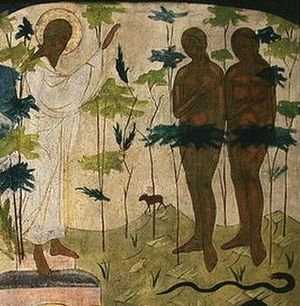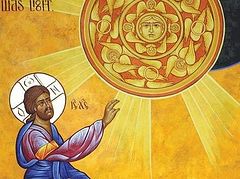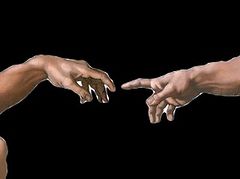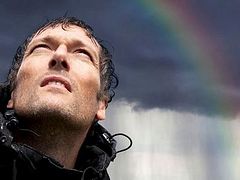Source: Pastoral Ponderings
Gregory the Theologian placed the synthetic —body and soul—quality of human existence in the larger context of the whole created order, within which he distinguished three stages. The first stage, he said, was the creation of the angels, described as a created projection of the “first light,” which is God Himself (Orationes 40.5).
These creatures are the most like God, Gregory declared, noetic spirits described in Holy Scripture as an immaterial form of fire. Indeed, so great was Gregory’s awe of the angelic nature, he confessed, that he would have thought angels incapable of falling, except that they did, in fact, fall! Rebelling against the eternal light, they became powers of darkness and evil—in truth, “our tempters” (38.9).
Creation’s second stage, according to Gregory, was that of the material universe, a compound of such physical elements as earth, water, and sky. Although lower than the order of angels, this physical universe was blessed with beauty, harmony, and order. Until God created human beings, however, there was nothing in the material world capable of thinking; purely material creatures are the least like—and the furthest removed from—God (38.10).
The third stage of the created order began on the sixth day of Creation, when God formed the human being in His own image and likeness. Man, the being created in this third stage, combines in his own existence the diverse qualities of the other two stages, the spiritual and the material.
Man is the only sub-angelic creature endowed with the faculties requisite for free, conscious, and sequential thought. Unlike other physical creatures, which are governed entirely by environment and instinct, human beings are able to make choices. Their deliberate decisions transcend the influences brought to bear upon them. This is what distinguishes man from the other creatures with whom he shares the earth. Thus, unique among God’s creatures, man is distinguished by a capacity for historical experience.
Indeed, the very notion of “history”—as something distinct from “nature”—is meaningless without man’s ability to choose a direction for his existence. When God created man, He created him, the Fathers declared, avtexsousios, “possessing self-determination.” This distinctly human quality, freedom of will, pertained to man’s very being from the beginning. It is presupposed in the very fact that God gave Adam and Eve a command—and, therefore, a choice whether or not to obey it—in the original Garden of his existence.
Early Christian witnesses to this thesis include the second century Bishop of Lyons, Irenaeus, who cited the Lord’s many commandments as proof of man’s to avtexsousion, “self-determination” (Against the Heresies 4.37.3). Why would the Creator have given a “law” to man unless man was able to make a choice with respect to that law? There is “no coercion in God,” Irenaeus reasoned; “God made man self-determining (avtexsousios) from the beginning” (4.37.1). Irenaeus went on to declare that Man’s freedom of choice is modeled on the very freedom of God, “in whose likeness man was created” (4.37.4).
Gregory the Theologian followed Irenaeus and other Church Fathers very closely on this question. The commandment given to Adam and Eve in the Garden was not intended to limit man’s freedom but to provide him with the opportunity to use that freedom: “[God] gave him a law as the matter (hyle) upon which to exercise his self-determination (avtexsousion) (Orationes 38.12).
Although the final purpose of their creation was not manifested until its culmination in Christ, God made human beings in order that they might seek Him, adore Him, and, by obeying Him, to be like Him and to become united to Him (39.7, 13; 45.28). In short, man was made for deification, theosis. This is the true destiny of “the living being, placed here but transported elsewhere, and, to perfect the Mystery, destined to be deified (theoumenon) through his attraction to God” (38.11).
Gregory provides an integrated picture of the narrated historical process through which human beings, endowed with free well in their very creation, may grow to the final perfection of that endowment through theosis—likeness to God and union with God. God, who freely gives Himself to man, summons and enables man to give himself back to God. Only theosis explains man’s original endowment with freedom. For Gregory, the significance of freedom does not lie in a mere possibility among choices but in the potential for a transformed and transfigured life. Theosis is what God had in mind when He determined, “let us make man in Our image, after Our likeness.’ True anthropology means deification.




